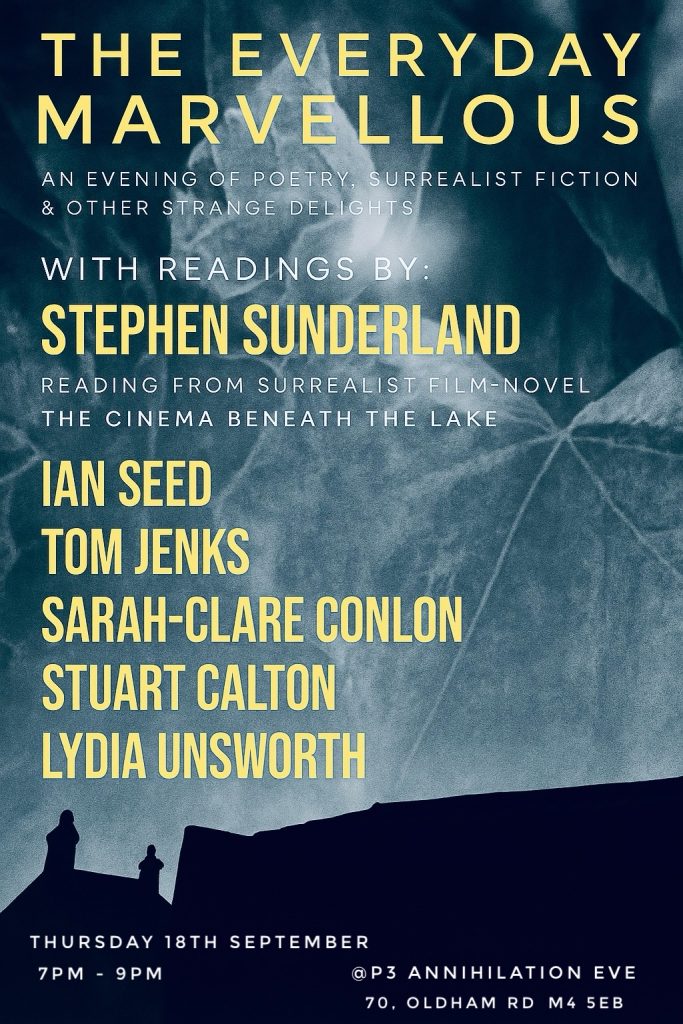Stephen Sunderland’s debut novel has been snapped up by Canadian publisher Orbis Tertius. A surrealist work described by one reviewer as ‘crammed with erudition and entertainment’, The Cinema Beneath The Lake took shape as Stephen’s PhD project, under the supervision of Professors Scott Thurston and Ursula Hurley. Fans of experimental fiction can join Stephen and literary luminaries on Manchester’s experimental writing scene at his book launch on September 18th, at Annihilation Eve.

Why did you want to write a novel?
It was a form I’d always wanted to try. I was writing longer projects in screenplay format and so it seemed like a natural progression. The concept I’d come across – The Cinema Beneath the Lake – seemed strangely more suited to the novel form, too, despite its obviously cinematic topic. It would have been hard to pitch to a studio at any rate! I had been reading surrealist prose and the work of writers like William Faulkner which made me think of the possibilities for much more complex organisations of voice, action and form than a screenplay would allow.
What led you to experimental forms?
I came to Surrealism through teaching surrealist cinema and from there, to the art and thought of the Paris group, led by André Breton. Breton’s criticism of realist conventions of narrative struck a chord – and after all I’d always been attracted to the fragmentation of forms ever since coming across T.S. Eliot’s The Waste Land as a teenager. I was writing the novel as the pandemic hit and during lockdown I went further down the experimental rabbit hole, exploring the relationships between text and image in visual poetry which fed back into my process and resulted in some publications.
What motivated you to write about the narrative and story of your debut novel?
The Cinema Beneath the Lake was sparked by reading an article by Bernard Roger called ‘Plans for a cinema at the bottom of a lake’ republished in The Shadow and its Shadow. I took it as my starting point in an automatic game of association which grew its own adventure story. I was also keen to explore historical surrealism from the perspective of a marginalised participant and discovered one ‘Suzanne’ who had been active during the surrealists’ trance experiments of 1922 but whose details remain sketchy. I tried to embody her perspective though this was of course a sheer fiction.
What role did the PhD have in shaping your novel?
The PhD forced me to make radical decisions about the process of writing. I limited myself to working with the kinds of creative techniques employed by the surrealists I was studying and submitted my research reading as much as possible to the concept of objective chance, allowing all kinds of accident to stimulate the direction of reading and writing. This led to some wild choices and an aura of mystery around the novel’s evolution which began to feel magical despite my rationalist leanings. The simultaneity of research and production made the novel what it is, reflection and adventure in one!
How did you find a publisher?
After some rejections and a fair bit of waiting around for things to be read, I was actually approached by an artist, Joseph Nechvatal, who asked me to write a review of his novella, recently published by Orbis Tertius Press. I agreed to do this, though quite busy at the time – to discover that the writing was really wild and exciting and experimental. It occurred to me that if they published this, they might like my novel. I sent the novel and some background detail to the press in late 2024 and within a month they offered to publish it.